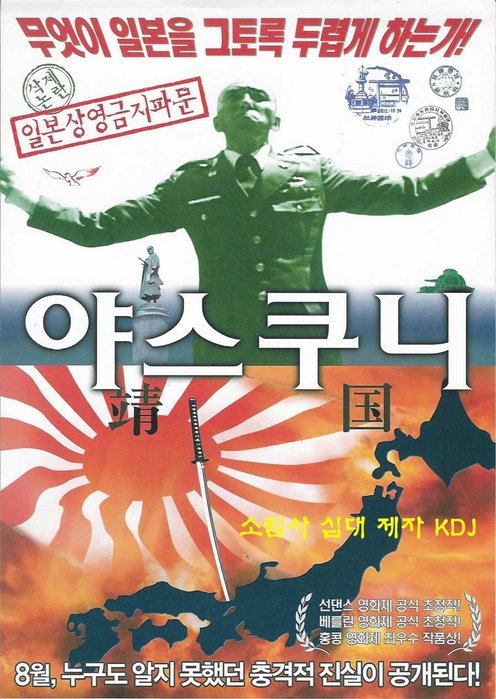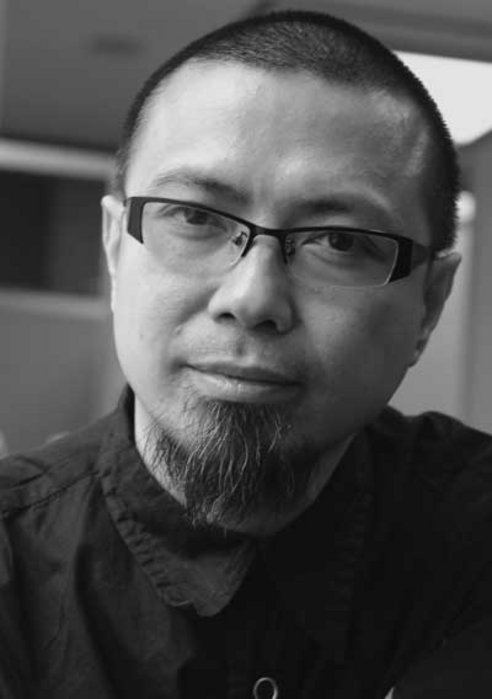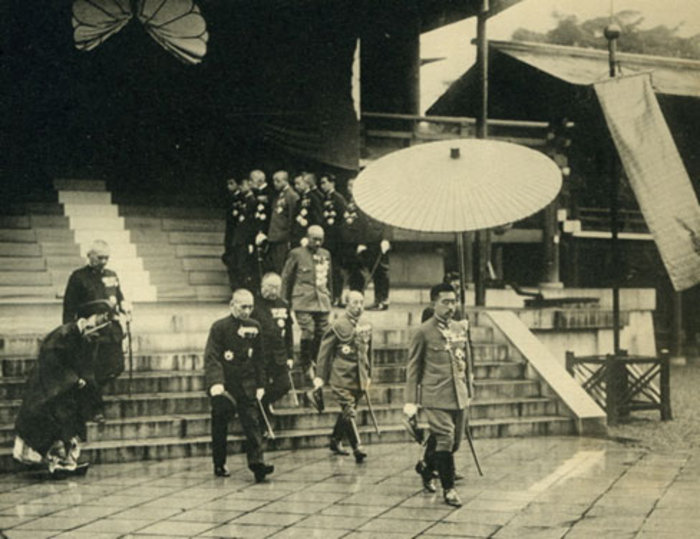On March 5, 2009, the first hearing in a civil suit against Chinese film director Li Ying was held in the Tokyo District Court. It was, ironically, twenty years to the day since Li first took up residence in Japan, and a year after his documentary, “Yasukuni,” became the center of a political maelstrom when all five theaters scheduled to premiere the film suddenly cancelled their screenings.
The cancellations were prompted by threats from right-wing nationalists to disrupt the screenings, coupled with harsh criticism of the political slant of the film by conservative members of the Japanese Diet (see David McNeill and John Junkerman, Freedom Next Time: Japanese Neonationalists Seek to Silence Yasukuni Film). Dozens of civil liberty and media organizations responded with statements condemning what was seen as political censorship, and theaters across the country stepped up with offers to screen the film.
“Yasukuni” will have its US premiere at the Film Forum in New York on August 12, and it will open at more than a dozen theaters in South Korea on August 6.
“Yasukuni” Succeeds at the Box Office, Under Police Protection
When “Yasukuni” eventually premiered in Tokyo and other major Japanese cities in May 2008, it was met with standing-room-only audiences, and it went on to show at more than sixty theaters nationwide over the next six months. According Li Ying’s production company, Dragon Films, the box office passed 130,000 admissions, setting a new record for a Japanese documentary (surpassing Hara Kazuo’s 1987 film, “The Emperor’s Naked Army Marches On”).
There was a heavy police presence outside the theaters in Tokyo and elsewhere. Plainclothes officers stood guard on both sides of the stage, to prevent the repeat of a 1998 incident where right-wingers slashed a screen at a Yokohama theater that was showing a film on the Nanjing massacre. There was a bomb threat at a theater in Kochi, resulting in body searches of the audience as they arrived, but otherwise the screenings took place without incident.
Police and the media watch over the crowd gathered for the Tokyo premiere of “Yasukuni,” May 2008.
Li Ying, however, was unable to attend the screenings of his film. Having received numerous death threats and knowing that his presence would spark a media frenzy, he remained in Beijing. “The premieres left me feeling both happy and lonesome,” he said during an interview on a recent trip to Tokyo. “It was kind of like not being able to be there when your child is born.”
The fact that the film did open successfully was gratifying to Li, who feels a deep commitment to Japan. “Many individuals and organizations spoke out in support of the film. But more important than defending the right to screen ‘Yasukuni’ was that they were defending the way Japan ought to function as a society.
“The controversy raised many issues: the relationship between politics and art; between film and authority; what’s proper for a documentary film; the postwar resolution of war responsibility; the issue of the emperor; Japanese shame. The film was often criticized for ‘shaming’ the Japanese. Those who saw it as a matter of shame, resisted the film out of pride. In responding to this, people had a chance to think about how a society should behave. It created a good opportunity.”
The Civil Suit: The Controversy Continues
The suit against Li came as something of a surprise, given that the film’s theatrical run had ended and the DVD had already been on the market for some four months. The plaintiff is Kuroiwa Toru, a man who appears in a short, 90-second scene early in the 123-minute film. He is claiming violation of his right to privacy.
Kuroiwa was filmed having a casual conversation with two other men on the grounds of Yasukuni Shrine on August 15, during the annual commemoration of the end of the Pacific War that is the centerpiece of Li’s film. He claims that he was unaware that he was being filmed and has suggested that Li used a hidden camera. (Li counters that he used a large, quite visible video camera and filmed from only several feet away.)
Kuroiwa described his motivation for filing the suit in a public declaration in February: “I absolutely cannot condone grave acts of aggression against the honor of Yasukuni Shrine and the heroic spirits of the dead, and by extension against the dignity of our country.” He goes on to declare his determination to fight in court against “this film’s Chinese director who brazenly commits this kind of uncivilized violence.”
The poster for the August 2009 nation-wide release of “Yasukuni” in South Korea
The lawyer filing Kuroiwa’s suit, Takaike Katsuhiko, was also head attorney in two other high-profile suits involving historical controversies: a 2003 case against journalist and author Honda Katsuichi over his reporting on the infamous 100-Man Beheading Contest that took place in 1937, and a 2005 case against Nobel laureate Oe Kenzaburo over his report that Japanese army officers coerced Okinawan civilians to commit suicide during the Allied invasion in 1945. Both suits were dismissed in the end, but they took several years to adjudicate and both writers were subjected to harsh attacks. Oe wrote little and appeared rarely in public during the years his case was on trial.
Takaike is also at the center of a class-action suit filed by more than 8,000 plaintiffs against NHK in June, contending that the national broadcaster was guilty of biased and distorted reporting in a program about Japan’s colonial control of Taiwan from 1895 to 1945. The program, part of an ongoing series called “Japan Debut” that traces the history of Japan’s emergence as a modern world power, examined the dark side of colonialism as well as the often-noted contributions Japan made to Taiwan’s modernization during the colonial period. Conservative members of the Diet have formed an alliance to examine NHK’s programming, and monthly rallies have been held to denounce the network’s “high crimes.”
All of these court cases share a common purpose: to discredit treatments of history that highlight the excesses of Japan’s imperial past. The suits run on a parallel track to the ongoing campaign to revise public school history texts to downplay incidents like the Nanjing Massacre and the military’s abuse of “comfort women” during the war. In fact, activist attorney Takaike also serves as vice-chairman of the Japanese Society for History Textbook Reform, which has led the revisionist effort.
The raucous NHK campaign may well overshadow the “Yasukuni” suit in the months to come, but as Li sees it, the point of the suit is to “restore Japan’s honor, to reinforce the impression that the film is misguided. Many of those who saw the film are still thinking about what to make of its content. The suit is an attempt to define how the film should be seen: as a film that employed unfair methods. That’s why they use extreme language like ‘grave acts of aggression.’ I’m the enemy, and I deserve to be crushed.
“I’m being sued for violation of the right to one’s image, and one’s image is one’s face. But it’s not an individual’s face that’s being defended. When you look at Kuroiwa’s declaration, he says he is ‘defending Japan’s honor.’ It’s not a suit to defend an individual’s face, it’s the face of the nation that’s at issue.”
The Spirit of Yasukuni and the Emperor
While Li is pleased that so many people have seen his film, the controversy created a frame within which people saw it, and this limited understanding of his message, he says. “People heard about the controversy and wanted to check out for themselves whether the film is really anti-Japanese. The question became: Is the film objective, is it balanced? The scenes are very dramatic, and people tend to get swept up in the drama. There are those who say, ‘Oh, he’s showing us this side of the issue, and that, addressing it from multiple perspectives, so it’s objective.’ But this is not the kind of film that aims for balance. It’s a very subjective film, addressing the concept of spirit.
“Yasukuni Shrine is a space that was created according to a theory of the spirit, and thinking about the spirit is very subjective. It’s very symbolic expression. At Yasukuni, some 2.46 million spirits are said to reside in a single sword, the object of worship at the shrine. Those ‘honored spirits’ reside in the shrine as deities. That’s very symbolic language, and the film uses that same symbolic language.
Director Li Ying
“The film is not about whether or not the prime minister should visit the shrine, it’s not about the politics, but about the spiritual structure of Japan. Yasukuni Shrine symbolizes the relationship between civilization and war. It epitomizes the complexity of postwar Japanese society, especially the relationship to the emperor. Many people who watch the film realize, for the first time, how strange the ‘stage’ of Yasukuni is. This strangeness is the result of a kind of spiritual disorder. But where does that disease come from? How can it be cured? Those questions remain.
“This film and the Yasukuni problem are not easy things to come to terms with, in particular because of the role of the emperor. In reviews of the film, and comments from intellectuals and public figures, everyone avoids the issue of the emperor. This is a central message of this film, but no one discusses it. They avoid it; they don’t want to think about it. This is a deep contradiction in Japan.”
Though Emperor Hirohito stopped visiting Yasukuni after 14 class-A war criminals were enshrined there in 1978, and the present emperor has also refrained from visits, the shrine’s connection to the emperor remains strong, Li argues. “The emperor continues to send offerings to the enshrined souls every year during the spring and fall festivals. When a new head priest is appointed, the emperor sends a letter of congratulations.
“The largest chrysanthemum crest, the symbol of the emperor, is at Yasukuni. It is the emperor’s space. The people who are enshrined there died for the emperor. It was the emperor who officially determined who would be enshrined at Yasukuni, who would be declared a ‘guardian deity of the state.’ Only the emperor could do this. Before and during the war, he was considered the most important of the gods, and as such, he could recognize others as deities. The emperor renounced his divinity after the war, but this system of recognizing deities remained unchanged.”
When General Douglas MacArthur and the postwar US occupation authorities chose to retain Emperor Hirohito on the throne and exempt from responsibility for his role in Japan’s 15-year war in Asia, they created the space for a continuity of spiritual and political belief that Yasukuni Shrine inhabits, Li argues.
“Article 1 of the postwar constitution defines the emperor as ‘the symbol of the state and of the unity of the people.’ He’s not a symbol in form only. He’s the face of Japan, the symbol of Japan’s spiritual culture, its aesthetics, its cultural values. That’s what created the complexity of postwar Japan. The war was fought in the name of the emperor, and he remained the symbol of Japan after the war. And the face of that symbol is Yasukuni.”
Silence: Japan Haunted by History
The through-line of Li’s film is provided by extended sequences with Kariya Naoji, the last surviving member of a group of craftsmen who forged 8,100 Yasukuni Swords on the grounds of the shrine during the war. The fact these swords were issued to Japanese officers and perhaps used in the notorious beheading incidents in China, coupled with the fact that the sword is the object of worship at Yasukuni Shrine, makes these scenes deeply symbolic. And it is the silence of the scenes that gives them power.
Kariya works in silence as he hand-forges a sword. He silently demonstrates the use of the sword, with an agility that belies his 90 years of age. And most poignantly, he maintains a prolonged silence as Li presses him with questions of what it meant to him to forge swords at Yasukuni during the war.
The silence is broken when Li asks what he listens to when he takes a break from work, and Kariya digs out an old cassette of Emperor Hirohito’s speeches. In the cassette player, the scratchy 1968 recording of a speech on the occasion of the 100th anniversary of the beginning of the Meiji period: “In these 100 years, our country has made startling progress as a modern state. I am overwhelmed with joy,” Hirohito intones in his high-pitched voice. “Today’s progress has been achieved through the wisdom and courage of our predecessors … and through the unceasing efforts of the people, together carrying the nation through innumerable difficulties.”
That this elderly craftsman has no words to describe his own involvement in the war is telling, and his silence is symbolic of the still unresolved sentiments of many of that generation. That he turns to Hirohito, more than 60 years after the war ended, to speak on his behalf, is equally evocative. But for Li, Hirohito’s unrepentant embrace of that century of Japan’s history is what cuts to the quick. He ends his film with an uninterrupted sequence of more than ten minutes of archival footage, tracing the emperor’s involvement with Yasukuni as the spiritual center of Japanese militarism.
Emperor Hirohito visits Yasukuni Shrine during World War II
“This is my own way of expressing what Hirohito says in his speech, that ‘everything we have today is thanks to the sacrifice of our forebears.’ There is no repentance for the overseas wars that took place during those 100 years. The spiritual structure of Japan contained in those words is sustained by Yasukuni Shrine. That’s what is so complex.
“The shrine is connected to Japan’s point of departure as a modern state. Some may consider World War II to be a war of aggression, but they don’t reject the Meiji period. Yasukuni Shrine embodies the nation’s collective memory since Meiji, which includes the colonization of Taiwan and Korea, Japan’s wars with China and Russia at the turn of the century, as well as the war in Asia and the Pacific.
“There are still many in Japan who believe that the colonization of Korea and Taiwan was a good thing. That’s why the suit has been filed against NHK’s program ‘Japan Debut.’ Japan hasn’t really paid much attention to the terrible things that took place during the era of Japan’s debut. That program just touched upon this subject, and it’s so sensitive that it created a big stir. It’s the same spiritual structure that’s involved: Japan’s pride as a modern nation. And it’s all connected to the emperor as the face of the nation, it’s all related. So when that’s attacked, the response is ‘to defend the honor of Japan.’”
Raising Uncomfortable Questions, Becoming Uncomfortable in Japan
Since the film’s release, Li has spent most of his time in Beijing. Partly this is because his next films are based in China, and he’s trying to raise funds to get them into production. But it’s also because “Yasukuni” has made working in Japan more difficult. “This film raises uncomfortable feelings for many Japanese,” he says. “They’re uncomfortable with the film, and uncomfortable with me. Many people have been supportive, but others have a hard time talking about the film. There are people I have worked with for many years, but when I meet up with them, it’s as if this film didn’t exist. It’s never brought up.
“It’s very complicated. Japan is a very important base for me. But, in reality, things have become very hard for me here. I’m seen as controversial. Proposals for new projects go nowhere. I build up a lot of stress when I’m here, and I feel I need a change of scene. But it’s hard to settle down in a new environment, so I really feel like I’m homeless. I plan to make my next film in China, but then I’ll want to come back here and work again. I have to open up new avenues, both here and in China, but that takes time. It’s a struggle now, the toughest time.”
Recommended citation: John Junkerman, “Li Ying’s ‘Yasukuni’: The Controversy Continues,” The Asia-Pacific Journal: Japan Focus, Vol. 31-1-09, August 3, 2009.






